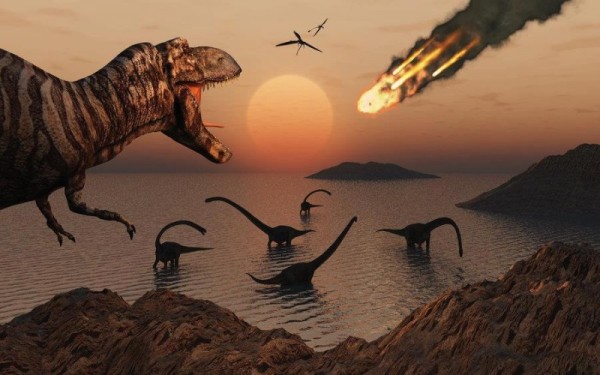By Dane Lorica, | January 16, 2017

A new study suggests that dinosaurs off probably died because of cold and darkness. (YouTube)
A new theory claims that dinosaurs may have probably died off to extinction due to cold and darkness following the asteroidal impact that disrupted their lives on Earth.
Researchers have created computer simulations of sulfuric acid droplets causing the temperature on the planet to drop down. They added that the cooling of the ocean's surface might have caused massive disturbances in the marine ecosystem.
Like Us on Facebook
The lead author of the study Julia Brugger said that following the asteroid impact, the Earth became really cold with a temperature of below freezing point in a span of three years. Co-researcher Georg Feulner explained that "the long-term cooling caused by the sulfate aerosols was much more important for the mass extinction than the dust that stays in the atmosphere for only a relatively short time."
Brugger said "the big chill following the impact of the asteroid that formed the Chicxulub crater in Mexico is a turning point in Earth history" and that new theories which provide better understanding of the extinction of dinosaurs after the Cretaceous era should be considered.
The researchers discovered that the recovery period occurred after roughly 30 years.
A huge asteroid that hit the Earth is believed to be have caused the sudden extinction of dinosaurs about 66 million years ago. Following their extinction, mammals rose, and men became dominant in the planet. "It is fascinating to see how evolution is partly driven by an accident like an asteroid's impact - mass extinctions show that life on Earth is vulnerable," Feulner said.
The co-author of the study noted that climate is very important for all living things. Ironically today, the most immediate threat is not from natural cooling but from human-made global warming," Feulner said.
The study was published in the Geophysical Research Letters.
-
Use of Coronavirus Pandemic Drones Raises Privacy Concerns: Drones Spread Fear, Local Officials Say

-
Coronavirus Hampers The Delivery Of Lockheed Martin F-35 Stealth Fighters For 2020

-
Instagram Speeds Up Plans to Add Account Memorialization Feature Due to COVID-19 Deaths

-
NASA: Perseverance Plans to Bring 'Mars Rock' to Earth in 2031

-
600 Dead And 3,000 In The Hospital as Iranians Believed Drinking High-Concentrations of Alcohol Can Cure The Coronavirus

-
600 Dead And 3,000 In The Hospital as Iranians Believed Drinking High-Concentrations of Alcohol Can Cure The Coronavirus

-
COVID-19: Doctors, Nurses Use Virtual Reality to Learn New Skills in Treating Coronavirus Patients







